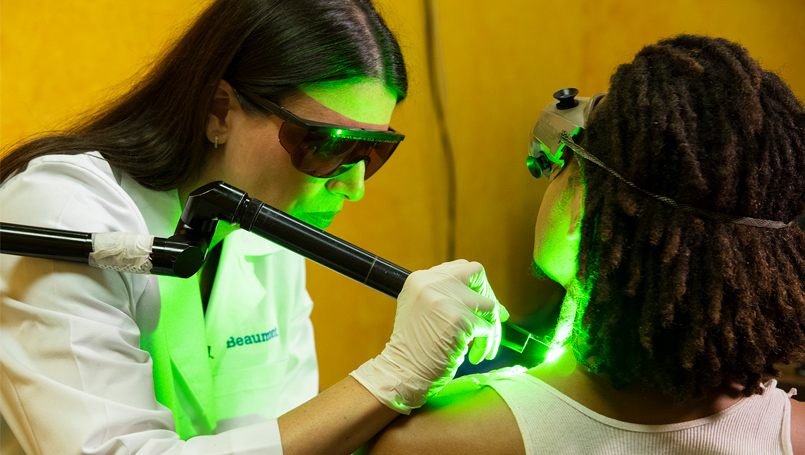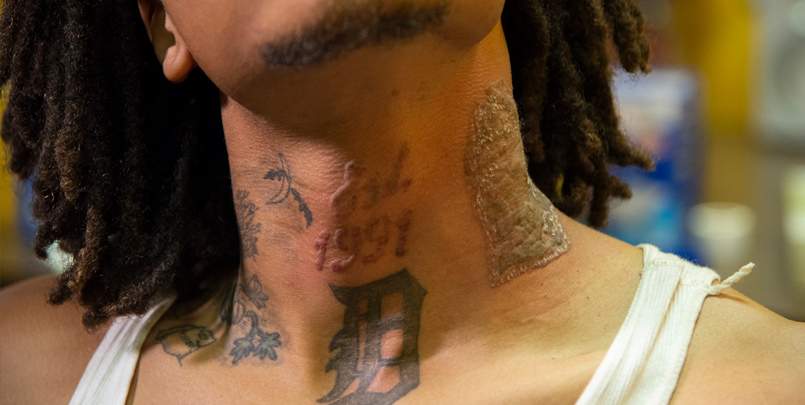Thursday, August 30, 2018

Detroit’s Freedom Ink program offers this free service to ex-convicts, former gang members
Lance Alexander, 27, describes himself as a returning citizen from the Michigan Department of Corrections. A convicted felon, he is also a human being in need of compassion. Lauren Law, D.O., a third-year dermatology resident at Beaumont Hospital, Farmington Hills, has been helping Alexander for months by giving free laser treatments to rid him of tattoos, several of which he obtained in prison.

Erasing ink from the past is helping Alexander to move forward with his life. Even before he was released from prison, Alexander was in touch with Monica Alvarado, manager of the Freedom Ink Tattoo Removal Program, part of the Detroit Hispanic Development Corporation. Like clockwork twice a month for nearly 10 months, Alexander has been taking the bus from the Detroit shelter where he lives to DHDC in Corktown to receive these painful laser treatments on the tattoos he wants, and needs, to shed. The only one he is keeping honors his older brother who was murdered at age 20 when Alexander was just 13.
“I would be willing to pay for this valuable service, but I don’t have a job yet,” Alexander said. Helping ex-convicts and former gang members to get clean and get a job is Freedom Ink’s goal.

“We require our clients to commit to a drug-free and gang-free lifestyle. They also have to be employed or looking for work,” said Alvarado. She says that due to legal and societal barriers, once ex-offenders are released, it is more difficult for them to find gainful employment compared to the general populace, secure a consistent source of housing and generally function in society.
Alvarado continued, “Removing a person’s gang and prison tattoos is life changing. The stigma is lifted. Some of the barriers to a better life disappear. I’ve witnessed personalities change for the better.”

Alexander wants a normal life that includes what most of us can take for granted, such as a secure job, a home, a car and a family. At age 16, he became homeless when his grandmother’s house was foreclosed on by the lender. “I started to run the streets, got rebellious. It felt like everything had been taken away from me, so I started taking from others.”
When a man saw him breaking into the house next-door, he shot Alexander twice in the knee.
At the beginning of each laser session, Dr. Law asks where patients would like her to start. Depending on the tattoo’s size, sessions last from five minutes to an hour. For a tattoo to fade completely, it takes 6-8 sessions. Patients say the laser feels like hot grease on their skin.
“When I am treating a patient at Freedom Ink, I don’t pry,” Dr. Law said. “It’s important to allow them to get to know me, become comfortable and earn their trust. As trust builds with each session, the stories of their individual tattoos and personal journey unfold.”
Dr. Law is one of five dermatology residents from Beaumont, Farmington Hills who volunteer with Freedom Ink and have been helping to remove Alexander’s, and others’, tattoos.
“It’s an emotional journey for both patients and physicians,” Dr. Law said. “To have some of the past removed and a chance at a new start is exciting. At first, they have so much hope and want the tattoos removed quickly. Yet, it’s a slow process. When the transformation occurs, patients feel liberated, gaining confidence and their sense of pride as the ink fades. I, too, am growing by working with a diverse patient population and learning about different cultures, all of which is making me a more experienced physician.”

During its 10 years, the program has helped hundreds of participants, like Alexander, and is among only three free tattoo-removal programs in the nation. Freedom Ink is the only program of the three where dermatology residents perform clinical rotations.
